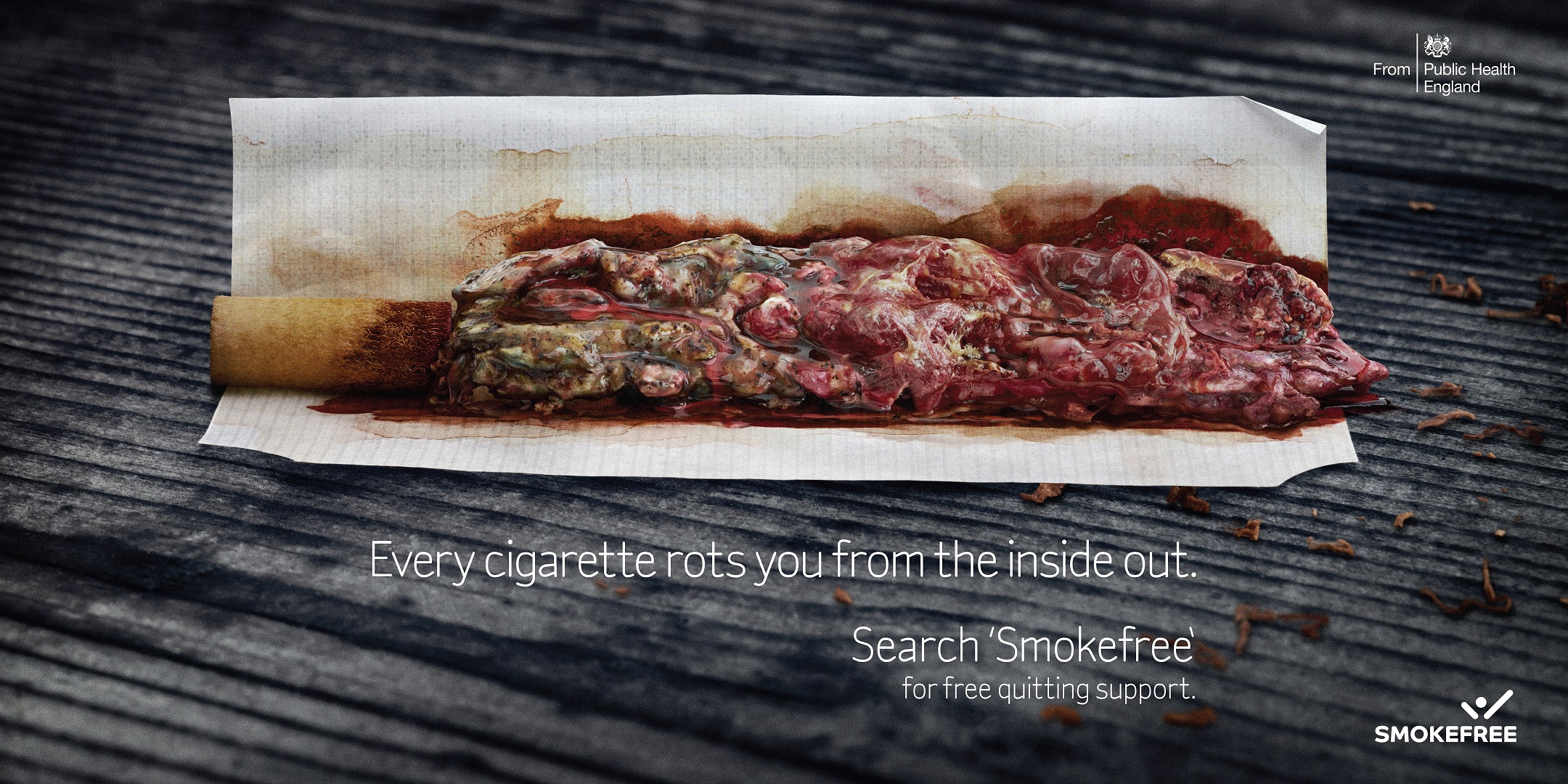Ditch the rotten roll-ups and quit

People smoking roll-ups could be kidding themselves it is less deadly – that’s the message from Fresh as they urge people to quit for good this New Year.
The warning that roll-ups are just as harmful comes as new figures show 30% of smokers in the North East – around 153,000 people – smoke roll-ups as part of their overall tobacco consumption. Hand rolling has doubled since 2009, meaning many smokers have switched from smoking just cigarette sticks.
Today, Public Health England launches a powerful new campaign to highlight how smoking damages the body and causes a slow and steady decline in a process akin to rotting.
The campaign launches as a new expert review commissioned by Public Health England highlights the multiple impacts that toxic ingredients in cigarettes can have on your body. Whilst many smokers know that smoking causes cancer and harms the lungs and heart, the new report highlights how it also damages:
Bones and muscles
– Smoking causes progressive harm to the musculoskeletal system, and has a negative impact on bone mineral density. Harms include:
-25% increased risk of any fracture and a 40% increase in the risk of hip fractures among men
-healing after injury
-Increased risk of back and neck pain, leading to a 79% increase in chronic back pain and a 114% increase in disabling lower back pain
-Significant cause of rheumatoid arthritis and can reduce the impact of treatment
Brain
– Current smokers are 53% more likely to develop cognitive impairment than non-smokers and 59% more likely to develop Alzheimer’s disease
Teeth
– Smoking increases the likelihood of tooth loss and decay
Eyes
– Smoking damages sight by increasing the risk of age-related macular degeneration (AMD) by 78%-358% and increasing the risk of age-related cataracts
With New Year’s resolutions approaching and two thirds of smokers saying they want to quit, new adverts are being used to graphically illustrate the degeneration that smoking causes.
The campaign also tackles common misconceptions around hand-rolled tobacco, or roll-ups. Use of roll-ups nationally has increased significantly. In 1990, 18% of male smokers and 2% of female smokers said they smoked mainly hand-rolled cigarettes but by 2013 this had risen to 40% for men and 23% for women. New figures show that half of smokers (49%) who only smoke roll-ups wrongly believe they are less harmful than manufactured cigarettes. In fact, hand-rolled cigarettes are at least as hazardous as any other type of cigarette.
Roll-ups contain as many harmful chemicals as manufactured cigarettes and smoking them attacks the body and causes the same health risks including cancer, stroke, heart and lung disease, impotence, infertility, and even amputation from Peripheral Arterial Disease. Yet some roll-up smokers believe hand rolling tobacco is more natural and avoids some of the health risks.
Lisa Surtees, Acting Director of Fresh, said: “Most roll-up smokers are price conscious, and we have seen an increase since the start of the recession. But some smokers also wrongly believe it is more natural and contains fewer chemicals.
“The truth is that the tobacco inside is full of the same toxic chemicals as manufactured cigarettes. If it is smoked without a filter it can actually be more harmful for the smoker.
“It is vital people know that roll-ups are not organic, not natural, not pure, but are just as deadly. Hand rolled will kill one in two long term smokers, just the same as all cigarettes.”
There are more than 4,000 toxic chemicals inhaled when smoking cigarette sticks and hand rolling tobacco, many of which are carcinogenic and poisonous. The chemicals include:
- Polonium 210 – a highly radioactive element delivered directly to the cells inside the airways where it can cause DNA damage and cancer.
- Cadmium – a highly poisonous metal used in batteries
- Formaldehyde – a highly poisonous and used to preserve dead bodies
- Ammonia – usually found in strong cleaning fluids
- Benzene – used as a solvent in fuel
- Cyanide – industrial pollutant
- Arsenic – a deadly poison found in insecticides
Christine Dryden, Manager of Newcastle NHS Stop Smoking Service, said: “Many smokers want to quit at New Year but aren’t sure about the best way to go about it. Stop Smoking Services provide friendly advice, support and encouragement that is tailored to each person.
“Thousands of people have quit for good with the help local NHS Stop Smoking Services. With our help smokers are much more likely to quit successfully than going it alone.
“People don’t always succeed first time – the most important thing is to never give up on quitting smoking.”
Professor Dame Sally Davies, England’s Chief Medical Officer comments: “Whilst many smokers know the damage cigarettes do to their hearts and lungs, they are much less likely to be aware of how harmful smoking is to the body – essentially ‘rotting’ it from the inside out, and roll-ups are no exception.
“January is a time when many people make New Year’s resolutions to improve their health and try to stop smoking. Millions of people have used Smokefree support and we are hoping that this year, even more will take advantage of the free expertise and resources on offer.”
Professor Kevin Fenton, National Director for Health and Wellbeing for Public Health England added: “Much of the harm caused by smoking doesn’t become obvious until middle age but the invisible damage can start shockingly early – even by the late teens. The earlier a smoker quits the better, but quitting at any age can help reverse at least some of the damage. That’s why there is no time better than now to quit. Stop smoking and stop the rot.”
Digital and print billboards will feature a roll-up cigarette full of decaying tissue, whilst an online viral will see a father casually rolling up a cigarette formed of rotting human flesh – all bringing to life the fact that: ‘every cigarette rots you from the inside out’.
This will be joined by the ‘Mutations’ and ‘Toxic Cycle’ adverts used in previous campaigns. These campaigns have helped smoking rates in England fall to an all time low this year of 18.4% and Public Health England will be continuing to help any smoker wishing to make a quit attempt in 2015 with a range of free and proven support tools.
If you want to quit, you’re up to four times more likely to succeed with local NHS Stop Smoking Service support. See your local pharmacy or GP, or visit nhs.uk/smokefree for free online quitting tools or the number of your local NHS Stop Smoking Service.
